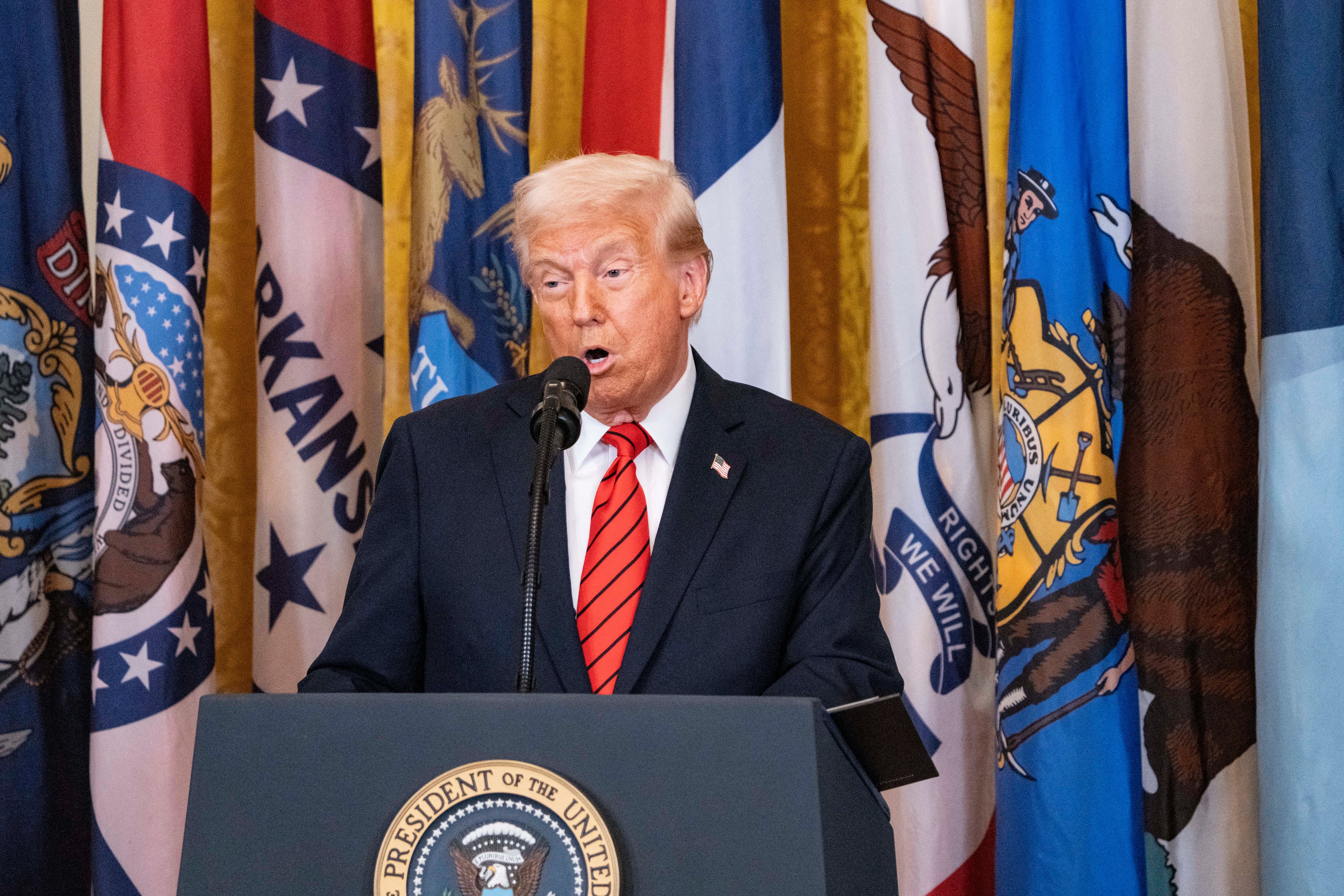Sign up for Chalkbeat’s free weekly newsletter to keep up with how education is changing across the U.S.
President Donald Trump’s assault on what he’s called “discriminatory equity ideology” is underway, and it’s been virtually impossible to miss.
The president broadcast his intent very early to strip away practices and beliefs in education that he believes are not just against the law, but contrary to American values. Since then, his administration has translated that desire into aggressive actions to get schools on board.
Perhaps the most forceful of these involves Trump’s attempt to banish from schools what federal officials call illegal emphasis on diversity, equity and inclusion, or DEI.
Supporters say it’s a justified countermeasure to the left wing’s attacks on merit and unlawful obsession with racial and other disparities and differences. Critics allege that by threatening to withhold funding from schools that don’t comply, it’s the Trump administration that’s breaking the law, not schools, and that Trump is maliciously misrepresenting what educators are doing.
Below are details of what the federal government has done, the response from state and local officials, and what might come next.
How has Trump’s anti-DEI push taken shape?
On April 3, the U.S. Department of Education told state education agencies that they must certify they are in compliance with the administration’s contested interpretation of federal civil rights law. Those that don’t sign will lose their federal funding, including Title I dollars that provide critical resources for high-poverty schools, the message said.
State schools chiefs are being asked to certify they are in compliance with Title VI, which bans discrimination on the basis of race or shared ancestry. States and school districts already regularly certify Title VI compliance. But the document goes further by also asking them to certify compliance with Students for Fair Admissions v. Harvard, a 2023 Supreme Court decision that barred the use of racial considerations in college admissions.
The Trump administration argues that many common practices under the umbrella of diversity, equity, and inclusion are now illegal in light of the Students for Fair Admissions case. Many legal experts disagree.
The department originally gave states 10 days to comply, with state agencies responsible for guaranteeing school districts were also in compliance. That deadline has since been extended to April 24, and the department has agreed not to enforce the certification process in the interim.
The certification requirement follows a February Dear Colleague letter in which the Education Department told school leaders that the department’s Office for Civil Rights would be enforcing federal anti-discrimination requirements through the lens of the Students for Fair Admissions case.
The Trump administration is signaling that states should take its threats to withhold funding seriously. In an unprecedented move, the U.S. Department of Education said Friday it was moving to strip K-12 aid from Maine following an investigation under Title IX — the federal law banning sex discrimination in education — into the state’s policy for transgender athletes.
What has Secretary Linda McMahon said about DEI?
Administration officials say they want to root out illegal discrimination and the certification request should not be controversial. But questions about an exact definition of DEI, and inappropriate uses of it, can produce a blizzard of confusing responses.
The Education Department put out guidance earlier this year that clarified that schools, for example, could teach African American history and celebrate Black History Month. But programming that “acts to shame” students based on their race or “accuse them of being oppressors” could create a hostile environment.
The department also said efforts to diversify honors or magnet programs using non-racial criteria, such as ending the use of test scores in admissions, could be illegal. The same goes for things like scholarships for teachers of color, and separate graduation ceremonies to celebrate students of color.
Asked about the department’s DEI crackdown April 8 at the ASU+GSV Summit in San Diego, Education Secretary Linda McMahon said “discrimination is the bad thing.”
“We shouldn’t have discrimination anywhere, whether it’s religious, whether it’s race, whether it’s sex, there should be no discrimination,” she said. “Everyone should be treated equally, educated equally.”
How Democrat-led states responded to the DEI demand
National teachers unions have sought to block enforcement of the certification requirement. But many Democratic-led states are also signaling that they will not change their practices and are asserting that they already comply with federal civil rights requirements, regardless of what the federal government is demanding.
New York came out first and most forcefully against the Trump administration. The day after the federal Education Department sent its demand, state education officials said they would not sign any additional certifications. They indicated the federal department lacks the power either to change the terms of federal grants absent a formal process, or to compel agreement with its interpretation of the 2023 Supreme Court ruling.
“We understand that the current administration seeks to censor anything it deems ‘diversity, equity & inclusion (DEI).’ ... But there are no federal or State laws prohibiting the principles of DEI,” Daniel Morton-Bentley, New York State Education Department counsel and deputy commissioner, wrote in a letter. “And USDOE has yet to define what practices it believes violate Title VI.”
Asked about New York state’s response, an Education Department spokesperson told Chalkbeat in an email: “The Department is simply asking school districts to certify they are following the law and not using race preferences or pernicious race stereotypes in schools.”
Minnesota took a similarly forceful approach, as did Washington state. Other states, including Pennsylvania and Illinois, also told federal officials they are already in compliance with federal requirements while questioning the legal basis for the new certification. Michigan’s state superintendent signaled his state won’t comply, as did top education officials in California.
Colorado Commissioner of Education Susana Córdova said April 10 she would not sign the certification and that the Trump administration’s demand runs afoul of another law, the federal Paperwork Reduction Act. But she did say she would sign an assurance that the state is in compliance with Title VI.
In Vermont, Education Secretary Zoie Saunders initially asked school districts to certify compliance while also downplaying any need to change their practices. Facing pushback from local leaders, she backtracked and said the state would send its own compliance letter.
“The political rhetoric around this federal directive is designed to create outrage in our communities, confusion in our schools, and self-censorship in our policy making,” Saunders said in a statement. “But we are not going to allow the chaos to control how we feel, or how we respond.”
As of Friday, 11 states said they were declining to sign the certification sought by the Trump administration, according to Education Week.
States risk significant financial penalties — including the potential for private parties to bring claims of fraud — if they agree to the certification and are later found to have maintained a practice the administration disagrees with.
Chicago Mayor Brandon Johnson, meanwhile, has threatened to sue the Trump administration if it cuts off funding over DEI-related practices.
Conservatives take different approach to Trump DEI demand
At least a few places where Republicans hold power are taking a different approach.
On April 7, Puerto Rico became the first state or territory to sign, the conservative news site Breitbart reported. U.S. Secretary of Education Linda McMahon applauded the move.
Indiana followed, with state education officials saying they intended to sign the certification after collecting certifications from school districts. They noted that Republican Gov. Mike Braun also signed a state executive order replacing “DEI in government with MEI,” or merit, excellence, and innovation, and that schools need to comply with both federal and state requirements to end DEI practices.
New Hampshire, where the local chapter of the NEA has filed a lawsuit with the national teachers union and the American Civil Liberties Union to block enforcement of the administration’s DEI crackdown, has posted a public tracker of which school districts have already signed in compliance.
Like Indiana, New Hampshire and Puerto Rico have Republican governors.
The onus is on state and local officials to respond to the federal Education Department’s pressure over certification. But others are on notice as well: The first investigations opened under the Trump administration’s controversial interpretation of Title VI focused on universities’ support for a conference for Ph.D. candidates of color because it was not open to white graduate students.
The PhD Project, the nonprofit that organized the conference, has since opened its membership to people from all backgrounds.
Legal experts told Chalkbeat that programs and groups that exclude students or teachers of any racial background may not be legal. The Biden administration also warned schools against creating race-exclusive affinity groups.
Meanwhile, a conservative parent group has filed a complaint against Chicago’s Black Student Success Plan. The program aims to address longstanding disparities in how Chicago Public Schools educates Black students, but the parent group noted that students of all races struggle academically.
Chicago Public Schools has defended its approach and says it has no intention of changing its practices.
Erica Meltzer is Chalkbeat’s national editor based in Colorado. Contact Erica at emeltzer@chalkbeat.org.







